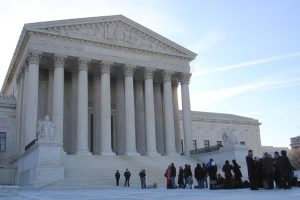FSC Petition Highlights Appellate Court’s Departure from Precedent
 WASHINGTON, D.C. – On Friday, the Free Speech Coalition announced the organization and its fellow plaintiffs in the case have filed a petition for writ of certiorari in the United States Supreme Court, asking the Court to overturn the Fifth Circuit Court of Appeals’ recent decision in Free Speech Coalition v. Paxton, the FSC’s challenge to the Texas statute commonly referred to as HB 1181.
WASHINGTON, D.C. – On Friday, the Free Speech Coalition announced the organization and its fellow plaintiffs in the case have filed a petition for writ of certiorari in the United States Supreme Court, asking the Court to overturn the Fifth Circuit Court of Appeals’ recent decision in Free Speech Coalition v. Paxton, the FSC’s challenge to the Texas statute commonly referred to as HB 1181.
FSC and the other plaintiffs are represented in the cert petition by the American Civil Liberties Union and the law firm Quinn Emanuel Urquhart & Sullivan.
Vera Eidelman, a staff attorney with the ACLU Speech, Privacy and Technology Project, said that while HB 1181 “purportedly seeks to limit minors’ access to online sexual content, the law in fact imposes significant burdens on adults’ access to constitutionally-protected expression, requiring them to provide personal identifying information online to access sensitive, intimate content.”
“This isn’t the first time that concerns about minors’ access have led legislators to pass unconstitutional laws,” Eidelman noted. “We’ve gone through this time and again, with everything from drive-in movies to video games to websites, and courts have repeatedly struck down laws imposing requirements that burden adults’ access to non-obscene sexual content in the name of protecting children.”
In the petition, the plaintiffs noted the Supreme Court “has repeatedly held that States may rationally restrict minors’ access to sexual materials, but such restrictions must withstand strict scrutiny if they burden adults’ access to constitutionally protected speech.”
“In the decision below, the Fifth Circuit applied rational-basis review – rather than strict scrutiny – to vacate a preliminary injunction of a provision of a Texas law that significantly burdens adults’ access to protected speech, because the law’s stated purpose is to protect minors. The question presented is: Whether the court of appeals erred as a matter of law in applying rational-basis review to a law burdening adults’ access to protected speech, instead of strict scrutiny as this Court and other circuits have consistently done.”
The petition added that the Fifth Circuit’s decision “openly defies” Supreme Court precedent and “begs for resolution by the high court,” as Judge Patrick E. Higginbotham put it in his dissent to the Fifth Circuit’s decision.
“As elaborated in Judge Higginbotham’s forceful dissent, the panel’s position is untenable and erroneous as a matter of law,” FSC added in the petition. “Indeed, the panel acknowledged that this Court applied strict scrutiny to a materially indistinguishable law in Ashcroft v. ACLU, before declining to follow Ashcroft based on what it considered ‘omissions’ in this Court’s analysis. Ashcroft was well reasoned and consistent with prior decisions. Nor can a lower court, in any event, disregard this Court’s precedent based on perceived legal weaknesses.”
The petition added the “Fifth Circuit’s decision also splits from the law of multiple circuits.”
“The panel majority admitted that its position departed from the Third Circuit’s in ACLU v. Mukasey,” FSC noted. “And as Judge Higginbotham demonstrated, the Second, Fourth, and Tenth Circuits have all applied strict scrutiny to laws indistinguishable from the one to which the Fifth Circuit applied rational-basis review here. Such acknowledged conflicts with the decisions of this Court and other circuits afford paradigmatic bases for this Court’s intervention.”
In the FSC’s statement, FSC Executive Director Allison Boden said that despite the claims of the age-verification law’s proponents “age-verification online is simply not the same as flashing an ID at a check-out counter.”
“The process is invasive and burdensome, with significant privacy risks for adult consumers,” Boden said. “In states where these laws have passed, the vast majority of users have refused to comply, leading to a massive chilling effect on their legal right to access constitutionally protected speech. Adult sites are the canary in the coal mine of free speech, and we look forward to defending the rights of all Americans to access the internet free from surveillance.”
You can read the FSC’s full petition here.













